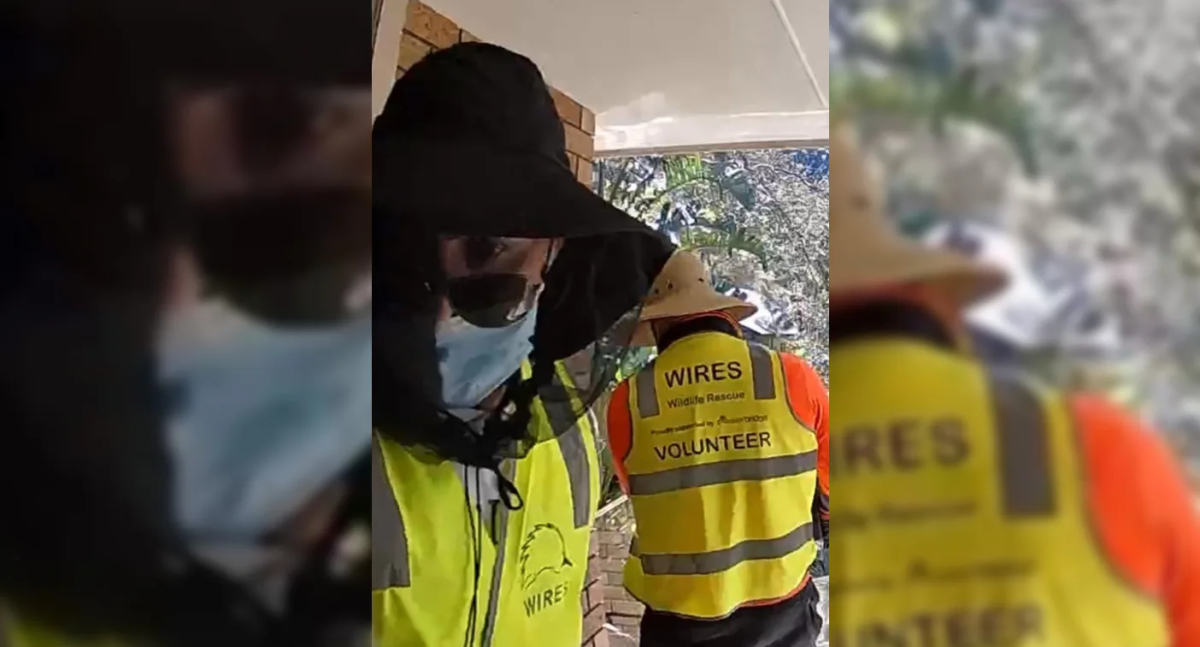
When criminals choose their disguises, they're banking on one thing: our natural inclination to trust people who appear to be helping others. And there's perhaps no organisation that commands more community respect than those dedicated to rescuing injured wildlife.
That trust was shattered for one Thirroul homeowner who discovered that two alleged thieves had used WIRES wildlife rescue vests as the perfect cover for their crime.
The incident has sparked important conversations about home security and how we verify the identity of people who come to our doors wearing official-looking uniforms.
A bold daylight deception
On September 17, a homeowner returned to his Thirroul property in NSW's Wollongong region to find his front door damaged and money, jewellery, and passports allegedly missing.
The security footage told a disturbing story: less than 30 minutes earlier, two unknown men wearing hats, sunglasses and hi-vis WIRES vests had entered his home through the garage.
The brazenness was remarkable. One of the men even turned a security camera away from their faces as they walked through, suggesting this wasn't their first rodeo. But it was their choice of disguise that has wildlife advocates and security experts particularly concerned.
'The use of the WIRES vests was a perfect cover for the alleged thieves'
Why WIRES makes such an effective disguise
WIRES is Australia's largest wildlife rescue organisation, assisting over 148,000 animals annually through their 24/7 emergency services. The organisation has 29 branches across NSW, making it the biggest wildlife volunteer group in the country.
For many Australians, particularly those who care about native animals, seeing someone in a WIRES vest immediately signals trustworthiness and community service. All animal rescuers and carers are volunteers, adding to the organisation's wholesome community image.
Sarah Hart, an independent wildlife rescue advocate who has worked in the sector since 2020, explained why the uniform choice was so clever: neighbours wouldn't expect any foul play if they happened to glance up at the property as the men entered while wearing the trusted branding.
The concerning rise in break-ins
The Thirroul incident comes at a time when break-ins have increased for the first time in over a decade, with 2.0 per cent of households (194,100) experiencing a break-in in the last 12 months according to the Australian Bureau of Statistics.
This was up from the lowest recorded rate of 1.7 per cent in 2020-21, which coincided with sustained periods of lockdowns and COVID-19 restrictions. As communities return to normal routines, opportunistic criminals are adapting their methods.
Break-in trends affecting Australian homes
Older respondents aged 58-67 were most likely to install deadlocks for security reasons
More participants added security cameras/alarm systems in 2024 than in 2022
More than 17 per cent of Australian participants had packages stolen from outside their homes in 2024
The vest controversy: Easy access or proper vetting?
The incident has highlighted a debate about how easily someone can obtain WIRES equipment. Hart raised concerns that the organisation's Rescue 101 online course allows people to receive vests for just $25 without proper background checks.
'They just basically sign up, do this course, pay their $25, and then they're posted a vest. At no stage does anyone meet them or vet them, because there are no background checks done,' Hart told Yahoo News.
However, WIRES CEO Leanne Taylor strongly disputed this characterisation. She told Yahoo News that 'all WIRES safety vests are provided after training is completed' and never simply handed out. Personal details, including photo ID, are captured 'for all training enrolments, regardless of the course.'
WIRES vest tracking procedures
- Every safety vest is tracked and recorded against the person's file
- Vests are not handed out at courses or stockpiled by branches
- Personal details and photo ID are required for all training
- The organisation maintains records of all vest distribution
The organisation confirmed it doesn't know who the vests used in the alleged break-in belonged to, noting they appeared to be older ones with previous branding. Importantly, WIRES hasn't been contacted by police about the matter.
How to verify legitimate wildlife workers
For residents, particularly those who spend more time at home during the day, it's worth knowing how to verify if someone claiming to be from WIRES is legitimate:
Before opening your door:
- Ask for identification and take time to examine it carefully
- Genuine WIRES volunteers should have proper ID with photo
- Ask specific questions about why they're visiting your property
- Check if you've made any calls to wildlife services recently
Trust your instincts:
- Wildlife rescues are usually responding to specific animal emergencies
- Genuine volunteers will be happy to wait while you verify their identity
- If you haven't called for help, question why they're there
You can always contact WIRES directly on their rescue hotline to verify if volunteers have been dispatched to your area.
Protecting your home from uniform deceptions
This incident is part of a broader pattern. Thieves often use disguises to try to conceal their identities, with previous cases including copper thieves dressed as tradies entering construction sites and a thief wearing a wig to steal televisions from a Sydney hotel.
Essential security steps for older Australians:
1. Strengthen entry points - Deadlocks continue to be the most sought-after security method with more than 55 per cent of Australians installing them.
2. Install visible security measures - Even basic security cameras can deter opportunistic thieves
3. Maintain the 'lived-in' look - Keeping a vacant-looking home with a full mailbox and unmoved trash bins can leave you exposed to opportunistic thieves.
4. Be cautious with uniforms - Remember that genuine service providers won't mind you taking time to verify their identity
5. Stay connected - Let trusted neighbours know when you'll be away and ask them to keep an eye on your property
A community learning moment
The Thirroul incident serves as a reminder that criminals are always adapting their methods. By choosing to impersonate WIRES volunteers, these alleged thieves understood exactly what would make neighbours less likely to question their presence.
While this shouldn't make us suspicious of every uniformed person who comes to our door, it does highlight the importance of taking a moment to verify identity—especially for those unexpected visits.
WIRES trains hundreds of new volunteers annually, equipping them with the skills needed for wildlife rescue and care. The vast majority of people wearing their uniform are genuine volunteers doing invaluable work for Australian wildlife.
Police are continuing their investigation into the Thirroul break-in, and the homeowner has offered a reward for information, though the amount hasn't been disclosed.
What security measures have you put in place at your home? Have you ever had someone come to your door in an official uniform, and how did you verify their identity? Share your experiences and tips in the comments below.
Original Article
https://au.news.yahoo.com/disturbin...-alleged-thieves-perfect-cover-235346746.html
WIRES—Home
Cited text: Support WIRES in rescuing and rehabilitating Australia's wildlife.
Excerpt: On September 17, a homeowner returned to his Thirroul property in NSW's Wollongong region to find his front door damaged and money, jewellery, and passports allegedly missing.
WIRES—Home
Cited text: WIRES is Australia’s largest wildlife rescue organisation.
Excerpt: WIRES is Australia's largest wildlife rescue organisation, assisting over 148,000 animals annually through their 24/7 emergency services.
About WIRES
Cited text: In 2024, WIRES assisted over 148,000 animals, and provided rescue services 24/7 across Australia, including providing Emergency Response to Greater Sy...
Excerpt: WIRES is Australia's largest wildlife rescue organisation, assisting over 148,000 animals annually through their 24/7 emergency services.
https://www.wires.org.au/about-wires
NSW Wildlife Information Rescue and Education Service—Wikipedia
Cited text: The organization has 29 branches across NSW, being the biggest wildlife volunteer group in the country.
Excerpt: The organisation has 29 branches across NSW, making it the biggest wildlife volunteer group in the country.
https://en.wikipedia.org/wiki/NSW_Wildlife_Information_Rescue_and_Education_Service
NSW Wildlife Information Rescue and Education Service—Wikipedia
Cited text: All animal rescuers and carers are volunteers.
Excerpt: All animal rescuers and carers are volunteers
https://en.wikipedia.org/wiki/NSW_Wildlife_Information_Rescue_and_Education_Service
Break-ins increase after record low | Australian Bureau of Statistics
Cited text: Break-ins have increased for the first time in over a decade, with 2.0 per cent of households (194,100) experiencing a break-in over the last 12 month...
Excerpt: break-ins have increased for the first time in over a decade, with 2.0 per cent of households (194,100) experiencing a break-in in the last 12 months according to the Australian Bureau of Statistics.
https://www.abs.gov.au/media-centre/media-releases/break-ins-increase-after-record-low
Break-ins increase after record low | Australian Bureau of Statistics
Cited text: Will Milne, ABS head of crime and justice statistics, said: “This was up from the lowest recorded rate of 1.7 per cent (171,600) in 2020-21, which coi...
Excerpt: This was up from the lowest recorded rate of 1.7 per cent in 2020-21, which coincided with sustained periods of lockdowns and COVID-19 restrictions.
https://www.abs.gov.au/media-centre/media-releases/break-ins-increase-after-record-low
Home Burglary Survey and Statistics 2024—Budget Direct
Cited text: Older respondents aged 58-67 were also most likely to install deadlocks for security reasons.
Excerpt: Older respondents aged 58-67 were most likely to install deadlocks for security reasons
https://www.budgetdirect.com.au/home-contents-insurance/research/home-burglary-statistics.html
Home Burglary Survey and Statistics 2024—Budget Direct
Cited text: · In 2024, more participants added security cameras/alarm systems, than in 2022.
Excerpt: more participants added security cameras/alarm systems in 2024 than in 2022.
https://www.budgetdirect.com.au/home-contents-insurance/research/home-burglary-statistics.html
Home Burglary Survey and Statistics 2024—Budget Direct
Cited text: In 2024, more than 17 per cent of Australian participants had packages stolen from outside their homes.
Excerpt: More than 17 per cent of Australian participants had packages stolen from outside their homes in 2024.
https://www.budgetdirect.com.au/home-contents-insurance/research/home-burglary-statistics.html
Home Burglary Survey and Statistics 2024—Budget Direct
Cited text: Deadlocks continue to be the most sought-after security method with more than 55 per cent of Australians surveyed installing deadlocks in their homes.
Excerpt: Deadlocks continue to be the most sought-after security method with more than 55 per cent of Australians installing them.
https://www.budgetdirect.com.au/home-contents-insurance/research/home-burglary-statistics.html
Did you know—3.5 per cent of Australian households were victims of break-ins or attempted break-ins | Defence Service Homes
Cited text: Keeping a vacant-looking home with a full mailbox, unmoved trash bins can leave you exposed to opportunistic thieves.
Excerpt: Keeping a vacant-looking home with a full mailbox and unmoved trash bins can leave you exposed to opportunistic thieves.
https://www.dsh.gov.au/news-and-med...were-victims-break-ins-or-attempted-break-ins
About WIRES
Cited text: WIRES trains hundreds of new volunteers annually, equipping them with the skills needed for wildlife rescue and care.
Excerpt: WIRES trains hundreds of new volunteers annually, equipping them with the skills needed for wildlife rescue and care.
https://www.wires.org.au/about-wires







